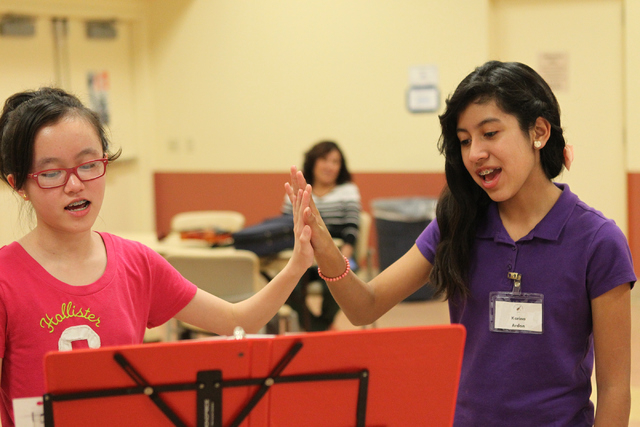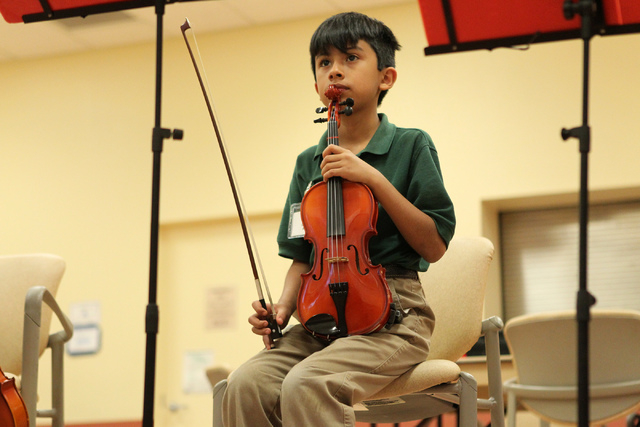Foundation works to ensure every child can play music
The young violinists stand in a semicircle around instructor Linda Rodgers, who announces that the next piece they’ll be rehearsing is the “William Tell Overture.”
A few kids respond with cheers of “Yay!” — it’s obviously a favorite — and one particularly exuberant player looses a quiet whoop and leaps into the air in the beginnings of a sort of not-fully-thought-out jig.
It’s certainly cute. Better than that, it’s impressive, considering that there’s no way the young violinists’ enthusiasm could possibly be connected to the piece’s double life as the theme to “The Lone Ranger.”
But, truth be told, there’s plenty of enthusiasm to be seen in the practice rooms of the East Las Vegas Community/Senior Center when Violins for Kids, a program of The Foundation to Assist Young Musicians, takes up residence there several days each week.
The program is one facet of the foundation’s three-pronged mission: to provide scholarships and financial assistance to music students studying at colleges and universities, to establish and promote performance and career opportunities — through funding special training, symposia, workshops and the like — for promising musicians, and to offer early music education to elementary school-age children who might otherwise not be able to afford it.
FAYM — note that the acronym reads as “fame” — was founded in 2007 by Hal Weller, founding music director and conductor laureate of the Las Vegas Philharmonic, who had happened to catch a YouTube video of a performance by Krzysztof Rucinski, a then-16-year-old violinist from Poznan, Poland.
“I wrote him, (saying,) ‘Nice job’ and he wrote back in perfect English,” Weller recalls. “I asked him, ‘Have you ever thought of studying in the United States?’ and he wrote back and said, ‘That’s impossible, my parents are very poor.’ ”
“It was the word ‘impossible’ that started me to think,” says Weller, who contacted friends and others in the music community. FAYM, a nonprofit organization, was created as a vehicle to provide higher-education financial support not only for Rucinski, but for other young, promising music students who need financial support to further their studies.
By the way: Rucinski came to the United States and studied at the Eastman School of Music in Rochester, N.Y., with financial assistance from FAYM, and was graduated with a bachelor’s degree in music in 2012. He then earned a master’s degree and is now back in Europe, Weller says. “He’s playing in a traveling chamber orchestra and he’s going to audition for the London Philharmonic.”
While Rucinski was FAYM’s first protege, the group has helped numerous other young musicians since then through its three-tiered program. Violins for Kids, its early childhood music training program, was designed to offer grade-school children whose parents can’t afford to pay for private music lessons the chance to learn music at no cost.
“The Clark County School District has a wonderful music program, but it begins in sixth grade,” Weller says. “It is an exemplary program nationwide, and we’ve got fabulous music educators in this system. I guess what we’re trying to do is give kids a head start who can’t afford the lessons.”
“The other thing is, we engage parents in the lessons,” Weller adds. “The parents must attend (lessons), and our parents are playing, too. We’ve got full-size violins, and I think we have at least a dozen parents who are playing right along with their kids, so it’s creating a family bonding activity.”
Children in the Violins for Kids program attend specific at-risk schools and must qualify for the free- or reduced-school lunch program to qualify for lessons. Children receive violins and supporting materials as well as two to three lessons each week. The program is based at East Las Vegas Community/Senior Center, although Weller says he hopes it can be expanded both geographically and to the high school level.
“We’ve got a handful (of kids) who have been here six years,” says Violins for Kids co-founder Arturo Ochoa, who oversaw a similar program during his tenure as principal of Sunrise Acres Elementary School. He notes that Violins for Kids is “not a dropout program. We ask the parents to be present.”
Gabby Ardon has four children, ranging in age from 7 to 12 years old, who have been participating in the Violins for Kids program for about three years. Do they like taking violin lessons? “No,” she admits, smiling. “Really, I push.”
“I feel it is helpful for them,” she says. “They grow up faster.”
During the first six months or so of study, Ardon says she would “say every day, ‘Come on, start practice.’ Now, they practice every day.”
Noemy Villanueva, 11, is in her second year with the program.
“I love it,” she says, because “when you play, you feel good.”
What’s the hardest part of learning to play the violin? “When you have to read notes,” she says.
And the best part? “When you practice and play for people. I enjoy it.”
Violins for Kids and FAYM’s other programs are funded through donations (http://thefaym.org).
“The interesting thing is, we’ve had donations from most every country in the world through our cyberconnections,” Weller says. “We’ve raised about $425,000, and we’ve connected kids with scholarships for about that same amount, about $400,000.”
Although many, if not most, of the young violinists in Violins for Kids probably won’t pursue music careers, Ochoa says the instruction they receive offers developmental benefits that translate into the classroom and, even, into life.
While heading his school program, which served as a sort of prototype for FAYM’s Violins for Kids program, “I told teachers, ‘I don’t want children to get behind in their academic work because of their time with music. So I want you to let me know if children are struggling in class’ ” Ochoa says.
“What teachers started reporting to me just universally is, ‘The child is blossoming in all areas of academics.’ ”
Music study can help a child to develop confidence and self-esteem, Ochoa adds, recalling one Violins for Kids participant who was “so shy, when his mother or father wasn’t in sight, the child started crying. And within a short period, this kid blossomed and developed self-confidence to the degree that not only did he play (in public), he walked to the front of the orchestra and sang to the audience.”
Ochoa says he talks regularly with kids about what they want to be when they grow up, and he regularly hears such answers as “doctor,” thanks to the confidence they develop in the program and the role models they meet.
“I see it,” Ochoa says. “We’re building futures.”
Contact reporter John Przybys at jprzybys@reviewjournal.com or 702-383-0280.



































